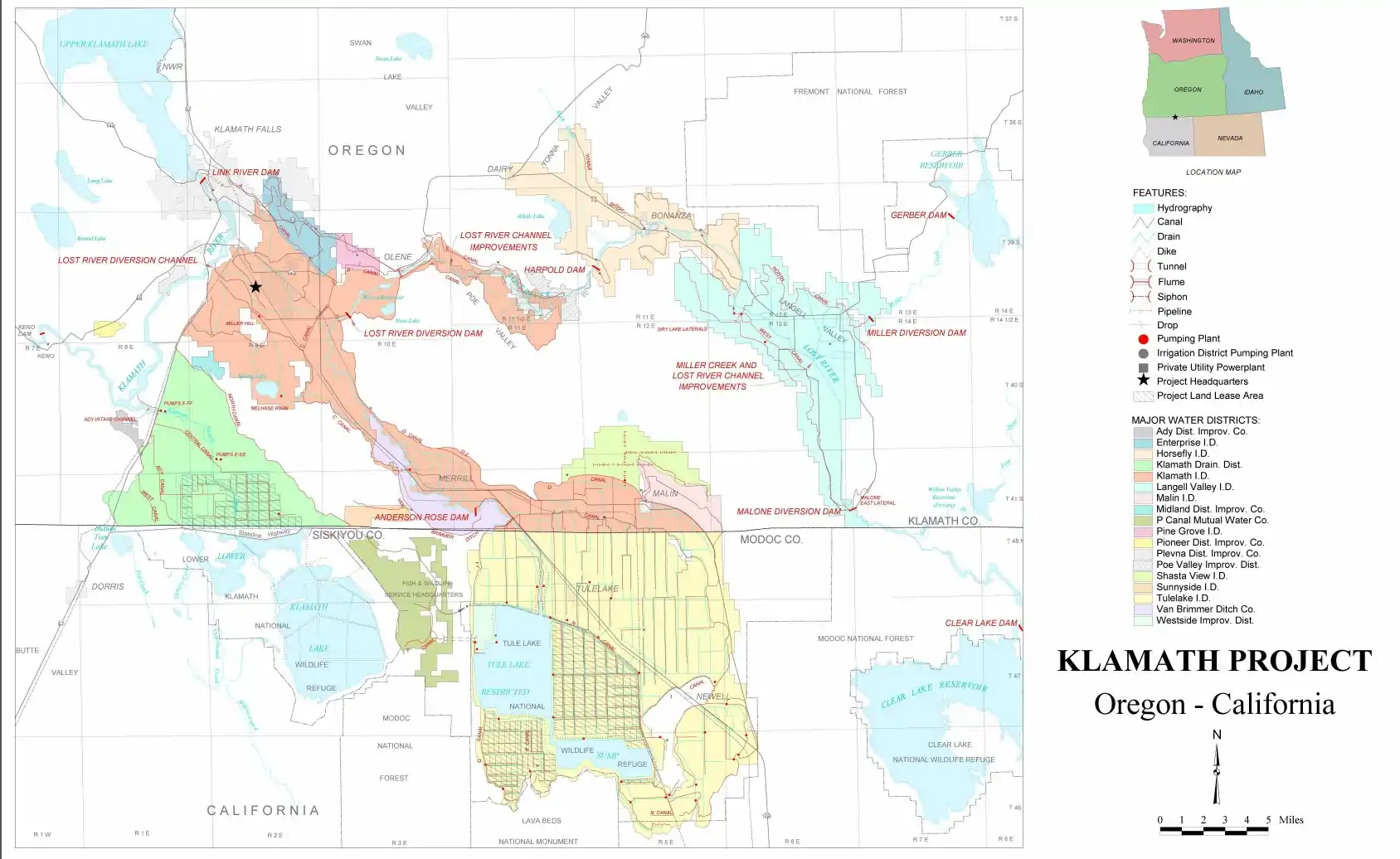Miller Creek (Klamath County, Oregon)
Miller Creek is a 7.6-mile-long (12.2 km)[2] stream in western Klamath County, Oregon, United States. It originates above Gerber Reservoir and empties into irrigation canals within Langell Valley southeast of Bonanza and finally into the Lost River.
| Miller Creek | |
|---|---|
| Location | |
| Country | United States |
| State | Oregon |
| Region | Klamath County |
| City | Bonanza |
| Physical characteristics | |
| Source | Gerber Dam |
| • location | northwest of Langell Valley |
| • coordinates | 42°12′36″N 121°7′48″W[1] |
| • elevation | 1,478 ft (450 m) |
| Mouth | Lost River at Langell Valley |
• coordinates | 42°0′34″N 121°14′23″W[1] |
• elevation | 1,262 ft (385 m) |
Miller Creek below Gerber Reservoir, part of the Klamath Project.
|
Course
Miller Creek originates above Gerber Reservoir which is impounded by Gerber Dam east of the city of Bonanza. It descends southward to Langell Valley, where it turns into canals and pumping plants, paralleling the road to Miller Creek Road until it finally empties into the Lost River's mile 55.6 (km 89.5). There is on average a one-degree difference in temperature between Miller Creek and the Lost River at their confluence. Miller Creek has spatial variability in temperature thresholds, especially observed in the lower 4.7 miles (7.6 km) of the stream.
Gerber Reservoir, on Miller Creek, provides storage for irrigation and reduces flow into the reclaimed portions of Tulelake and the restricted Tule Lake Sumps in the Tule Lake National Wildlife Refuge.[3]
History
The name honors James Miller (1814–1890), an Irishman who came across the continent in 1844 with the Stephens-Townsend-Murphy Party[4] and settled on part of Rancho San Pedro, Santa Margarita y Las Gallinas in 1845.[5][6][7]
Ecology
Although not well documented or understood, in recent years, Columbia River redband trout (Oncorhynchus mykiss gairdneri) have been identified in Miller Creek. The creek has been identified by the E.P.A., Klamath County Public Works, and the Oregon Department of Fish and Wildlife for trout restoration potential because the creek has high-quality, connected riparian habitat; minimal barriers to fish passage; and flow is subject to the operation of Gerber Dam. There is a high likelihood that these fish are coastal rainbow trout (Oncorhynchus mykiss irideus) of hatchery origin.[8]
See also
References
- "Miller Creek". Geographic Names Information System. United States Geological Survey, United States Department of the Interior. 28 November 1980. Retrieved 20 May 2014.
- National Hydrography Dataset high-resolution flowline data. The National Map Archived 2012-03-29 at the Wayback Machine, U.S. Geological Survey. Retrieved 9 March 2011.
- Klamath Project: Gerber Dam and Reservoir Archived 2011-08-08 at the Wayback Machine. U.S. Bureau of Reclamation. Retrieved 19 May 2014.
- Michael C. O'Laughlin (2003). Irish Families on the California Trail: Pioneers and 49ers from the Earliest Days Including the Gold Rush & San Francisco. Irish Roots Cafe. p. F-26. ISBN 9780940134614. Retrieved 19 May 2016.
- David L. Durham (2000). Durham's place names of the San Francisco Bay area: includes Marin, San Francisco, San Mateo, Contra Costa, Alameda, Solano & Santa Clara counties. Quill Driver Books. p. 106. ISBN 978-1-884995-35-4. Retrieved 5 September 2010.
- "Murphy, Hill and Miller Were Interesting Marin Pioneers". San Anselmo, California: The San Anselmo Herald. July 19, 1934. p. 4.
- "James Miller / County Wexford, Ireland". Retrieved 19 May 2016.
- Oregon Native Fish Status Report – Volume II. Upper Klamath Basin Redband Trout (PDF). Oregon Department of Fish and Wildlife. Retrieved 19 May 2014.
